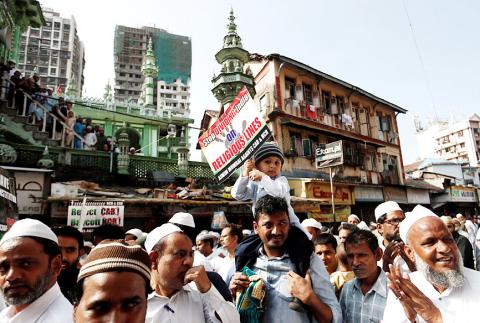A divisive citizenship bill has been signed into law in India, a move that comes amid widespread protests in the country’s northeast.
Two people were killed and 11 injured on Thursday when police opened fire on mobs in Assam State torching buildings and attacking railway stations.
Protesters have said that the law would convert thousands of illegal immigrants into legal residents.

Photo: Reuters
The new law lays out a path of Indian citizenship for six minority religious groups from the neighboring countries of Bangladesh, Pakistan and Afghanistan.
Indian President Ram Nath Kovind on Thursday gave his assent to the bill, signing it into law, an official statement said.
Prime Minister Narendra Modi plans to host Japanese Prime Minister Shinzo Abe at a meeting in Assam next week, as part of a campaign to move high-profile diplomatic events outside New Delhi to showcase India’s diversity.
A movement against immigrants from neighboring Bangladesh has raged in Assam for decades.
Protesters have said that granting Indian nationality to more people would further strain the resources of Assam and lead to the marginalization of indigenous communities.
Japan has stepped up infrastructure development work in Assam over the past few years, which the two sides are expected to highlight during the summit.
Abe plans to visit a memorial in the nearby state of Manipur, where Japanese soldiers were killed during World War II.
Critics of Modi’s Hindu nationalist government have said that the bigger problem with the new law is that it is the first time that India is using religion as a criterion for granting citizenship, and that it excludes Muslims from its scope.
The Indian Union Muslim League party has petitioned the Indian Supreme Court, saying that the law is in conflict with the secular principles of the Indian constitution, which guarantees equality to all, without any regard to religion. No date has been set for the hearings.

A fire caused by a burst gas pipe yesterday spread to several homes and sent a fireball soaring into the sky outside Malaysia’s largest city, injuring more than 100 people. The towering inferno near a gas station in Putra Heights outside Kuala Lumpur was visible for kilometers and lasted for several hours. It happened during a public holiday as Muslims, who are the majority in Malaysia, celebrate the second day of Eid al-Fitr. National oil company Petronas said the fire started at one of its gas pipelines at 8:10am and the affected pipeline was later isolated. Disaster management officials said shutting the

US Vice President J.D. Vance on Friday accused Denmark of not having done enough to protect Greenland, when he visited the strategically placed and resource-rich Danish territory coveted by US President Donald Trump. Vance made his comment during a trip to the Pituffik Space Base in northwestern Greenland, a visit viewed by Copenhagen and Nuuk as a provocation. “Our message to Denmark is very simple: You have not done a good job by the people of Greenland,” Vance told a news conference. “You have under-invested in the people of Greenland, and you have under-invested in the security architecture of this

Japan unveiled a plan on Thursday to evacuate around 120,000 residents and tourists from its southern islets near Taiwan within six days in the event of an “emergency”. The plan was put together as “the security situation surrounding our nation grows severe” and with an “emergency” in mind, the government’s crisis management office said. Exactly what that emergency might be was left unspecified in the plan but it envisages the evacuation of around 120,000 people in five Japanese islets close to Taiwan. China claims Taiwan as part of its territory and has stepped up military pressure in recent years, including

UNREST: The authorities in Turkey arrested 13 Turkish journalists in five days, deported a BBC correspondent and on Thursday arrested a reporter from Sweden Waving flags and chanting slogans, many hundreds of thousands of anti-government demonstrators on Saturday rallied in Istanbul, Turkey, in defence of democracy after the arrest of Istanbul Mayor Ekrem Imamoglu which sparked Turkey’s worst street unrest in more than a decade. Under a cloudless blue sky, vast crowds gathered in Maltepe on the Asian side of Turkey’s biggest city on the eve of the Eid al-Fitr celebration which started yesterday, marking the end of Ramadan. Ozgur Ozel, chairman of the main opposition Republican People’s Party (CHP), which organized the rally, said there were 2.2 million people in the crowd, but